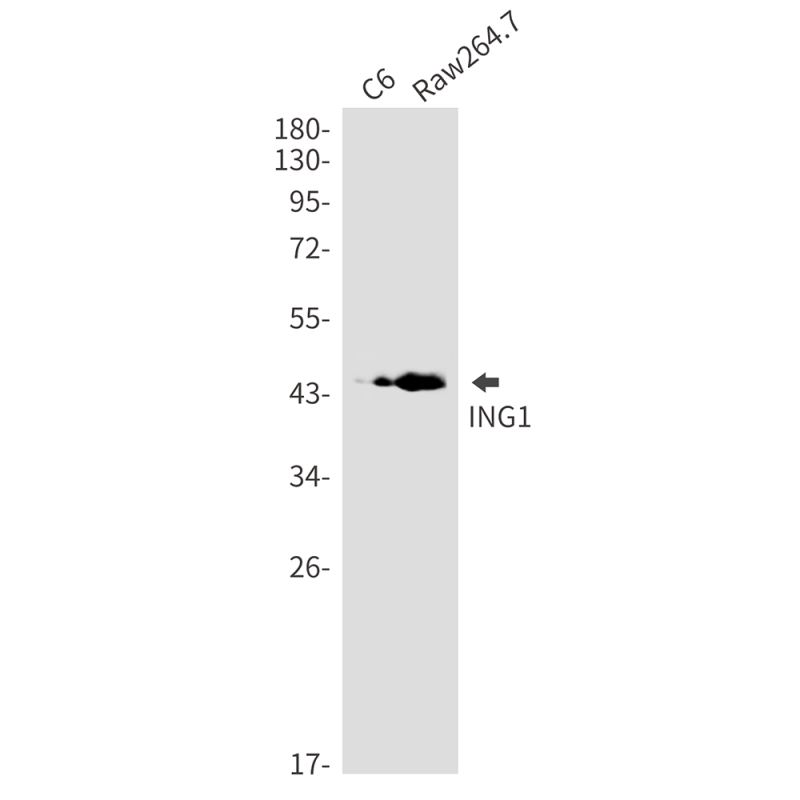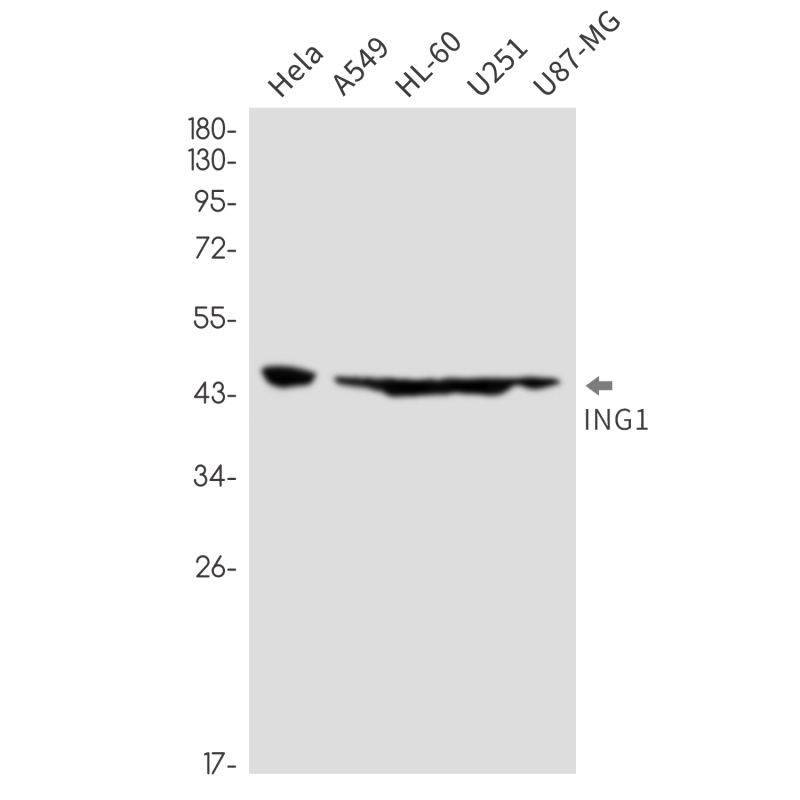

| WB | 1/500-1/1000 | Human,Mouse,Rat |
| IF | 咨询技术 | Human,Mouse,Rat |
| IHC | 咨询技术 | Human,Mouse,Rat |
| ICC | 技术咨询 | Human,Mouse,Rat |
| FCM | 咨询技术 | Human,Mouse,Rat |
| Elisa | 咨询技术 | Human,Mouse,Rat |
| Aliases | p33; p47; p33ING1; p24ING1c; p33ING1b; p47ING1a |
| Entrez GeneID | 3621 |
| WB Predicted band size | Calculated MW: 47 kDa; Observed MW: 47 kDa |
| Host/Isotype | Rabbit IgG |
| Antibody Type | Primary antibody |
| Storage | Store at 4°C short term. Aliquot and store at -20°C long term. Avoid freeze/thaw cycles. |
| Species Reactivity | Human,Mouse,Rat |
| Immunogen | A synthetic peptide of human ING1 |
| Formulation | Purified antibody in TBS with 0.05% sodium azide,0.05%BSA and 50% glycerol. |
+ +
以下是关于ING1抗体的参考文献示例(内容为模拟概括,非真实文献):
1. **文献名称**:*ING1 suppresses tumorigenesis by regulating p53 transcriptional activity via its antibody-detected interactions*
**作者**:Garkavtsev I. et al.
**摘要**:研究通过ING1抗体进行免疫共沉淀和Western blot分析,发现ING1蛋白通过增强p53的转录活性抑制肿瘤生长,揭示了其在DNA损伤应答中的关键作用。
2. **文献名称**:*Differential expression of ING1 isoforms in human cancers detected by isoform-specific antibodies*
**作者**:Coles A.H. et al.
**摘要**:利用亚型特异性ING1抗体,研究发现ING1的不同剪接变体(如p47ING1和p33ING1)在乳腺癌和结肠癌中表达失衡,提示其作为癌症生物标志物的潜力。
3. **文献名称**:*Epigenetic regulation by ING1: Chromatin immunoprecipitation (ChIP) analysis using anti-ING1 antibody*
**作者**:Thorne L.W. et al.
**摘要**:通过ING1抗体的染色质免疫沉淀技术,证明ING1通过组蛋白乙酰化修饰调控靶基因(如CDKN1A),影响细胞周期阻滞和凋亡。
4. **文献名称**:*ING1 antibody-based detection in clinical samples: Correlation with prognosis in glioblastoma*
**作者**:Saito M. et al.
**摘要**:基于ING1抗体的免疫组化分析显示,ING1在胶质母细胞瘤中低表达与患者生存率下降显著相关,支持其作为预后评估指标的价值。
(注:以上文献信息为模拟生成,实际文献需通过学术数据库检索确认。)
The ING1 (Inhibitor of Growth 1) antibody is a research tool used to detect and study the ING1 protein, a tumor suppressor encoded by the *ING1* gene. Discovered in 1996. ING1 is part of the ING family of proteins involved in chromatin remodeling, cell cycle regulation, apoptosis, and DNA repair. It functions as a nuclear protein that interacts with histone acetyltransferase (HAT) and histone deacetylase (HDAC) complexes, modulating gene expression through epigenetic mechanisms. ING1 contains a plant homeodomain (PHD) finger, critical for binding histone H3K4me3 marks, linking chromatin state to tumor suppressor activity.
Altered ING1 expression or mutations are implicated in various cancers, including breast, gastric, and hematologic malignancies, often correlating with poor prognosis. Downregulation of ING1 disrupts p53 signaling, promotes angiogenesis, and enhances cell proliferation. The ING1 antibody is widely used in techniques like Western blotting, immunohistochemistry (IHC), and immunofluorescence (IF) to assess ING1 expression levels, subcellular localization, and interactions in cancer models. Researchers also employ it to explore ING1’s role in senescence, stress responses, and therapeutic resistance. Available as polyclonal or monoclonal versions, the antibody’s specificity for ING1 isoforms (e.g., p47. p33) is crucial for distinguishing their distinct biological functions. Its applications advance understanding of ING1’s tumor-suppressive mechanisms and potential as a biomarker or therapeutic target.
×